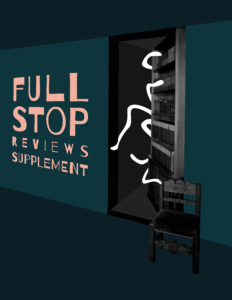The following is the introduction to the latest issue of the Full Stop Reviews Supplement. To read the rest, subscribe at our Patreon page.

With the global rise of far-right ideologies, certain literary and philosophical texts have come back into fashion as people look for conceptual tools to help them understand and respond to this dangerous and disturbing phenomenon. Hannah Arendt’s The Origins of Totalitarianism and George Orwell’s 1984 are obvious examples of books whose sales have skyrocketed in recent years. In this context, Roberto Bolaño’s Nazi Literature in the Americas deserves far more attention than it has been given, in particular for thinking about the relationship between fascism and literary culture. An encyclopedia of imaginary right-wing writers in the wake of World War II, Nazi Literature in the Americas consists of a series of short literary biographies. These are the stories of individuals (vile, often pathetic) living their lives in pursuit of literature, a pursuit inextricably linked to their fantasies of power and persecution in the decades following the collapse of the fascist behemoths of Western Europe. An alcoholic poet pens nostalgic verses of her moment as a baby in Hitler’s arms, a science fiction writer publishes a speculative saga of the rise of Fourth Reich in the American midwest, featuring a German Shepherd with telepathic powers and Nazi tendencies, a Chilean pilot and artist goes into hiding after presenting an infamous photography exhibition documenting his serial murders but remains a source of fascination in South American Fascist magazines. When it was first translated into English in 2008, commentators were particularly drawn to the way these figures functioned as a mirror for literary culture more generally, thinly veiled renderings of the leftist literary culture that Bolaño had been a part of in Mexico City. In this, they took the lead of Bolaño himself, who claimed in an interview, “When I am talking about the right, of course I am really talking about the left.” On the one hand, critics noted the way in which the text eviscerates the notion that writing literature is an inherently virtuous calling, free of ideological commitments and petty scrabbles for power. On the other hand, many critics meditated on the way Bolaño leads his readers to sympathize with the miserable creatures he depicts, whose lives reveal, beneath their wretched ideologies, a universal experience of passionate servitude and inescapable failure at the feet of Art.
Today, it is perhaps easier to see Nazi Literature in the Americas as a map of the active relationship between the literary arts and fascist politics. While Bolaño’s writers are imaginary, the role of the arts for promoting right-wing ideologies is not. Far from revealing the humanity of fascist artists, it would be more accurate to say that Bolaño’s book is an exploration of the process of normalization that literature and literary institutions can enact. This includes, but is not limited to, the sympathetic identification that literature elicits from readers. To understand this, we might turn especially to the final pages of Bolaño’s book, the “Epilogue for Monsters.” This epilogue is a set of lists: “Secondary Figures,” “Publishing Houses, Magazines, Places . . .” and “Books.” Where the body of the text takes as its frame of analysis the life narrative, this paratextual apparatus illuminates the conditions of possibility for fascist fantasy, which is to say for fascism. It is worth noting that in a book whose style is characterized by its mock-academic objectivity, Bolaño chooses to apply the morally weighted term “monsters” not to his fascist writers, but to the magazines, publishers, and minor figures that make their work possible. It suggests that if we want to understand the relationship between fascism and literature today, and to respond to this work, to fight it, we need to consider not just individual writers or works. We need to understand the infrastructure that this work calls into existence, and that makes this work possible.
This issue of the Full Stop Reviews Supplement takes up this insight, featuring a long essay by Shane Burley that investigates the role of literary publishing in the normalization and growth of neo-fascism today. Burley examines the activities of two publishing houses, Counter-Culture Publishing and Arktos Media. Both publishers, starting around 2010, hoped to engage in what they cited as “metapolitics.” Following the intentional strategy of the far-right in Europe, and taking cues from left-wing publishers like Verso, they seek to shift politics by shifting what is possible to think, to feel, and to dream in the minds of the public. So instead of taking to the streets, these presses have pursued the long-term goal of building a white nationalist, fascist culture by publishing and promoting works of philosophy, esoteric spirituality, and cultural commentary. This has included a heavy focus on literary and film criticism and original fiction, highlighting authors like Tito Purdue and Andy Nowicki while re-engaging older figures like H.L. Mencken and H.P. Lovecraft. Through art, these publishers hope to change how we think of ourselves, how we engage with multicultural society, and how we see ethics, history, and progress. This strategy has gained quite a bit of ground over the past ten years helping to normalize and recruit into the Alt Right.
There is no doubt a risk in such analyses of providing a platform to right-wing organizations, lending legitimacy through serious attention. But there is also a risk in ignoring them. Like the Frankfurt School of critical theory beginning in the inter-war period, cultural analysis today can help us to interpret and explain the causes of reactionary social, political, and economic movements, and to envision alternative paths forward. But where works like Max Horkheimer and Theodor W. Adorno’s 1944 work Dialectic of Enlightenment aimed its critiques of the “culture industry” at the relationship between mass culture and fascism, at this moment it is more necessary to take into account the fragmentation and ramification of the cultural field that new technologies of publishing and advertising make possible. Terms like underground, outside, and marginal are troubled by a reigning decentralization of culture.
If one part of a committed response to the work of fascists in literary spaces is to uncover their strategies and infrastructures, analyze their rhetoric, and deflate their claims, the other, Burley argues, is for the left to respond with a metapolitic of its own. Contemporary literature offers up to its readers visions of the present, possibilities for how to think, feel, and dream with others. Speculative fiction plays an important role here, providing the imaginative terrain upon which new policies and social forms can take hold. As afro-futurist Kodwo Eshun puts it, “science fiction is a means through which to preprogram the present.” It is perhaps no surprise that in recent years small presses have published valuable collections aimed at imagining more socially just futures. These include Octavia’s Brood: Science Fiction Stories from Social Justice Movements edited by adrienne marry brown and Walidah Imarisha (AK Press) and Accessing the Future: A Disability-Themed Speculative Fiction Anthology edited by Kathryn Allanand Djibril al-Ayad. Here at Full Stop, our interest in the small press grows out of a belief in the valuable insights of marginal writing and the emergent perspectives it offers in response to our contemporary moment. Thus, like our previous issues of the Full Stop Reviews Supplement, this issue features some of our favorite book reviews, these published on our site in the second half of 2018. Although not all of the reviews that Full Stop publishes are explicitly political in nature, reviews like those by Caren Beilin on A Working Woman, Gabrielle Civil on M Archive, Marcel Inhoff on Father’s on the Phone with Flies, and Franziska Lamprecht on The Stolen Bicycle offer examples of public literary criticism sensitive to the metapolitical possibilities of contemporary literature.
Subscribe at our Patreon page to read the rest of the issue.
This post may contain affiliate links.







